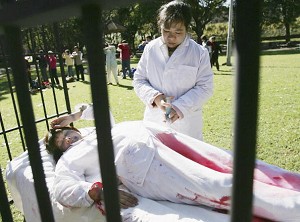A secret concentration camp in Sujiatun, China has stockpiled thousands of Falun Gong practitioners who are being killed for their organs, say two separate witnesses. They say the organs are removed at an adjacent hospital, the Liaoning Provincial Thrombosis Hospital of Integrated Chinese and Western Medicine, while the prisoners are still alive. A subsequent investigation has provided corroborating details.
"Organs harvested from live bodies are worth far more than organs taken from dead bodies," says a woman whose ex-husband was a brain surgeon at the hospital who removed corneas from the still-living practitioners.
"After their organs were cut out, some of these people were thrown directly into the crematorium to be burnt, thus leaving no evidence," she says. The woman estimates that three quarters of the 6,000 Falun Gong practitioners believed to be held at the concentration camp have already been killed.
Her March 17 testimony corroborates an account given by a former Chinese reporter the previous week. "Mr. R" was the first to disclose the existence of the secret concentration camp in Sujiatun, a suburb of Shenyang City, located in China's northeast. They say the camp has been operating since 2001, with routine organ harvesting producing significant revenue.
According to a separate investigation conducted by the World Organization to Investigate the Persecution of Falun Gong (WOIPFG), doctors involved have become psychologically traumatized by the bloody proceedings. Some have even been pushed to suicide. Others are afraid to that they will be killed if they disclose any information about what goes on in Sujiatun.
"Something Unimaginable"
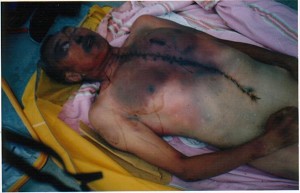
Choosing to remain anonymous, Mr. R says that even locals are unaware of what takes place behind three-meter-high, barbed-wired walls that surround an old civil defense facility that is connected to the hospital.
He describes himself as a long-time reporter who had worked for a Japanese television news agency, specializing in news on China. Chinese himself, his ability to obtain taboo images, such as of last December's shootings in Shanwei, caused him to be arrested for "revealing state secrets." Through connections he was able to get out of jail on the pretext of poor health, and the promptly fled to the United States.
"To be honest, I am not afraid of death," says Mr. R, reflecting on measures that the Chinese Communist Party (CCP) might try to take against him for his disclosures.
"I believe this is an issue of whether or not I am a responsible journalist and human being," he says. "The faith of my profession…drives me to expose these atrocities."
While conducting interviews in Shenyang City, Liaoning province, Mr. R learned that few Falun Gong practitioners were still detained in Dabei Prison or the notorious Masanjia Labor Camp. Instead, the practitioners jailed there as a result of the CCP's campaign against Falun Gong had been transferred to Sujiatun.
"Most prisons and labor camps have detainees going in and out, and eventually information will be brought out," he says. "But this Sujiatun Concentration Camp has not had anyone come out yet," so nearly nothing is known of its existence.
Once practitioners are sent to Sujiatun, "the CCP won't let a prisoner consume food forever. So what are they up to, then?" he asks. "Why was a crematorium built?"
"The answer is something unimaginable," he says. "The "practitioners are killed for their organs." Many of the practitioners die on the operating table, according to Mr. R, who says he has numerous information sources in the area around Sujiatun, and confidence in their reliability.
He says Falun Gong practitioners are seen as a prime source of organs, owing to their nearly limitless supply—as many as 2 million Falun Gong adherents are said to be currently held in China's vast system of labor camps and prisons.
"They [CCP authorities] can't find enough bodies through executions, and no bodies are more readily available for this business than those of the [Falun Gong] practitioners," he explained.
"Even doctors are involved in this trade."
A Bustling Business
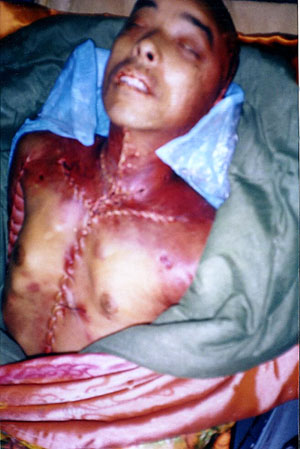
According to the China International Organ Transplant website, whose Chinese mirror URL has mysteriously stopped working as the Sujiatun story got out, at least 5,000 kidney transplants are conducted in China every year, attracting overseas customers.
A kidney transplant costs US$62,000, according to the site, while a heart can cost up to US$170,000 and a cornea as little as US$30,000.
According to the second witness, her ex-husband the brain surgeon had a cell phone specifically for this line of work.
"No matter when and where, as soon as the cell phone rang, he would go to perform the operation," she recalls. "During the two years of working at Sujiatun, he did several cornea removal operations per day."
It is very hard for her to retell these experiences. She and her husband had both worked at the Sujiatun hospital since 2001.
He became a surgeon in 2003, and she soon started noticing that he often became absent-minded. She recalls how he would watch TV holding a sofa pillow, and would not notice when she turned the TV off. He began having nightmares and became unable to drive.
"My ex-husband simply said he wanted to find another job. I was very surprised," she recalls. "I knew that my family had easy money, but didn't know the source. Later on, my ex-husband told me about this."
"Do Your Job"
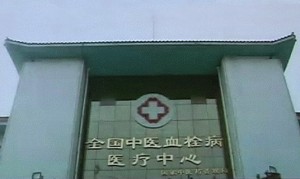
He told her that those detained in the Sujiatun concentration camp were all Falun Gong practitioners. For other prisoners, even ones who were sentenced to death, organ removal could not take place without proper paperwork. But due to the CCP's policy that the deaths of Falun Gong practitioners "counted as suicide," the hospital could remove their organs without any formal procedure.
There was no need to bother with getting permission from the families for cremation, as they did not know where their relatives were to begin with.
Hospital staff began privately discussing that the living practitioners had been secretly transferred to the vast underground chambers adjacent to the hospital. They all knew that the rear part of the hospital was forbidden, and it was always watched, the woman recalls.
She says some staff members questioned the hospital administration as to why such large amounts of food and so many daily supplies were purchased for the hospital's disproportionately smaller needs. The hospital authorities replied: "You only need to do your job well. There is no need for you to ask any other questions."
Every surgeon knew these people were Falun Gong practitioners, the woman says. They were told that harvesting the organs of live Falun Gong practitioners would not be considered a crime. Instead it was considered "cleaning" for the Chinese Communist Party. Medical personnel were told that these people were facing the death penalty for murder, or had become insane from practicing Falun Gong.
The amount of anesthetic was limited and the secret surgeries could not use the required doses. "In order to save on anesthetic, they economized on the anesthetic used in surgeries on these Falun Gong practitioners," she says. "The amount of anesthetic used was very small."
When her husband did not want to continue the work his supervisor told him: "You are already on this boat. Killing one is murder. Killing several is also murder."
"You don't understand my suffering," she recalls him telling her. "Those Falun Gong practitioners were alive. It might be easier for me if they were dead, but they were alive."
"He told me this with his own mouth," she says. "The fact that he could tell me this indicated that he had a little conscience left." But she says her husband had chosen money over life, and she decided to get a divorce.
"Your entire life is ruined," she told him.
Worried that he might some day be killed to keep him from talking, he went abroad.
The woman, now in the United States after a friend suggested she get away, believes that the organ harvesting continues.
"Three-quarters of these 6,000 people have died, having their hearts, kidneys, retinas, and skins harvested and their bodies disposed of," she says. As for the rest, she says she is afraid that the authorities will kill them in order to destroy the evidence.
World Investigation
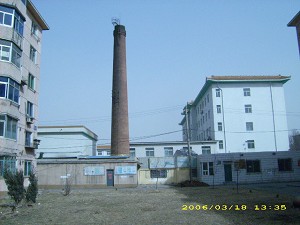
After the first witness had stepped forward with information about Sujiatun, WOIPFG began digging for evidence of the secret camp's existence.
WOIPFG investigators called the Sujiatun District and Shenyang City hospitals, posing as prospective organ buyers. They were shocked at how soon they were told they could get organs.
"[We] were so surprised—the answer is probably about two days," said WOIPFG researcher Kevin Yang. "That's impossible if they don't have anyone there to kill."
WOIPFG further found that the Sujiatun hospital, located on a 21,087-square-meter site, employs 460 people in 24 departments and 20 specialized offices. The organization suspects that the concentration camp is indeed located underground, built upon the existing infrastructure of an old aerial defense facility. The camp has at least one exit at the back of the hospital.
A hospital boiler may have been converted into an on-site incinerator for cremation. The camp is heavily guarded and has its own supply system, including underground shops. From above ground, one cannot detect anything unusual about the complex.
WOIPFG President John Jaw says that most or all of Falun Gong practitioners believed to be held in the camp were likely arrested on extrajudicial grounds and administratively sentenced. They have been detained "for their affiliation with the Falun Gong as opposed to having committed some sort of criminal act," he says.
Adherents of the popular spiritual discipline have been detained by the hundreds of thousands since 1999, according to the Falun Dafa Information Center. While the info center has details of 2,829 Falun Gong practitioners who have died as a result of mistreatment and torture in custody, countless remain missing.
"The pattern seems to be that they are first sent to the labor camps, without trial or hearing, and if they don't break down there and 'repent,' or renounce their beliefs, they are… transferred to Sujiatun," Jaw said. "There they've found a 'solution' for such people. They are turning 'the Falun Gong problem' into a source of dirty money."
With confirmation of the Sujiatun death camp, WOIPFG and other organizations are now hurrying to investigate whether additional camps exist in other parts of China. Word of concentration camps for Falun Gong have circulated since at least October 2000, when a source told Agence France-Presse of two camps, each capable of holding up to 50,000 persons. Another report that same month told of a similar camp in northwestern China's remote Xinjiang region.
Jennifer Zheng, a Falun Gong practitioner who has authored a book on her experience in a labor camp, recalls how Beijing police had threatened her during detention. "We will send you to a huge concentration camp, in a far area in north, northwest China," they said, "and you will never ever have a chance to come back again."
